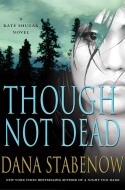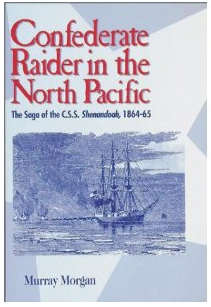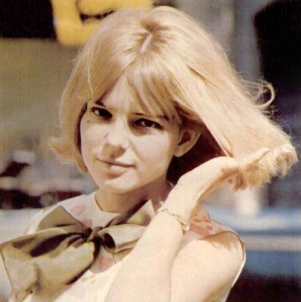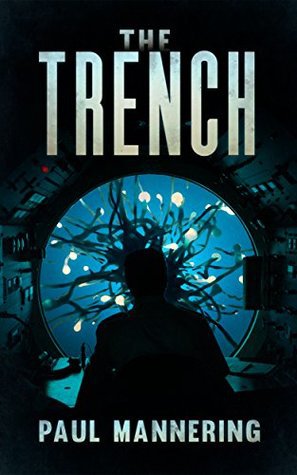This is one of those happy instances of the law of unintended writing consequences.

On page 271 of Though Not Dead, Old Sam tells Pappardelle, “I served in the Aleutians during the war. There wasn’t a lot to do, so every now and then to keep the enlisted out of trouble the brass would get the big idea to have educational talks by anyone they could sucker out of the ranks…One night this Signal Corps guy from Tacoma — what was his name? Morgan, that was it. Anyway, Morgan was some kind of writer or professor or something in real life and he gave us a talk about how the last shot fired in the American Civil War was fired in the Aleutians.”
Murray Morgan was a real person, and lo and behold, I log on to my website one morning to find this message from Murray Morgan’s daughter, Lane:
A friend just told me that my dad, Murray Morgan, is a minor character (or a referenced person) person in Though Not Dead. Very cool. He was indeed in the ASC in the Aleutians at the same time as Dashiell Hammett. I look forward to reading the book and wish Murray were still around to see the reference.
It turns out Morgan wrote long letters home from the Aleutians and Lane has been posting them on line here.

This guy just lived and breathed good writing. I met him through his book, Confederate Raider in the North Pacific, which tells the story of the last shot fired in the Civil War, fired, yes, by Confederate Navy Captain James Waddell who was disrupting the enemy’s economy by sinking Yankee whaling ships in the North Pacific. It is full of delightful prose and terrific little word pictures of the characters involved. One example from page 14:
Richard Wright was not the type of man usually involved in conspiracy. A Liverpool merchant, prosperous and proud of his family, he had a burgher’s respect for safety and six per cent.
Another from page 26:
Charles Francis Adams, the American Minister to Great Britain, was more a precision instrument than a human being. A brilliant, polished New Englander, the son and grandson of presidents, compressed to the hardness of a diamond by the accumulated weight of family tradition, he served as the cutting edge of American diplomacy.
And this about Captain Waddell from page 38:
Waddell was startled by the dissension. A romantic, a believer in the glory of war, he could not understand men who were untempted by adventure.
There are many more similarly wonderful prose portraits, especially of Waddell and his crew, who are parfit, gentil knyghts without sacrificing any attention to their mission, which they fulfill to admiration while murdering no man nor outraging any woman. One of my favorite stories is the whaler which is under the command of the captain’s wife, the captain having died on the voyage. She has preserved his body in a barrel of whiskey so she can take him home and bury him in the family plot. Waddell sinks her ship, but he sees the lady and her pickled husband both landed safely on shore afterward. Marvelous stuff.

Due to what I’m beginning to believe is the almost suicidal shortsightedness of American publishing, Morgan’s book is no longer in print, but fear not because there are used copies galore available on Bookfinder.com. This is the best book written on this subject, and it is well worth the extra effort to acquire. Accept no substitute.
Share!




